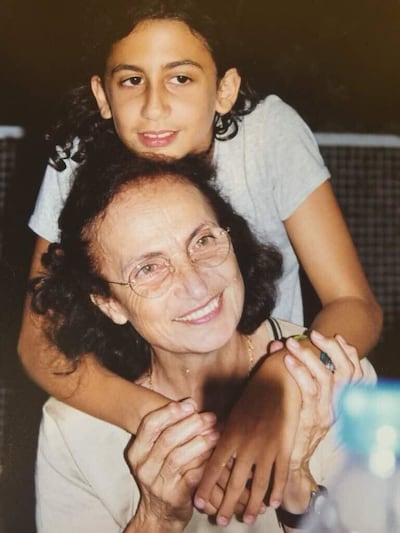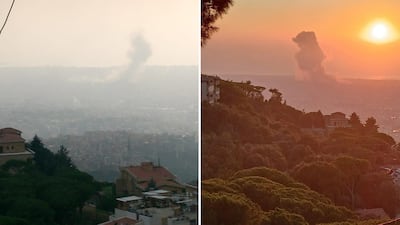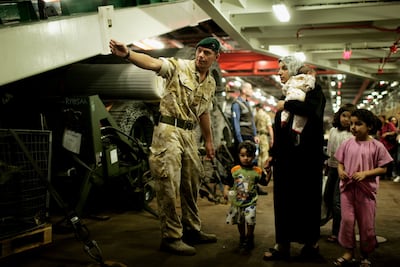Live updates: Follow the latest from Israel-Gaza
It was my grandmother who called the British embassy to register our names for evacuation from Beirut in 2006. My mum had said she would not leave her or Lebanon, despite the relentless Israeli bombing.
Today, my family faces similar questions once more, as the UK evacuates citizens from Lebanon on chartered flights.
We arrived in Beirut on July 12, 2006, the day that Hezbollah infiltrated the Israeli border, kidnapped two soldiers and killed three others. Israel retaliated that day by bombing bridges in the south of Lebanon.
My dad predicted the bombing would be over by the afternoon, and dropped my mum, brother and I off at the airport for our annual summer holiday. There were television crews on the flight with us to Beirut – a sign that others were thinking differently. Israel bombed the airport a few hours after we arrived, and I was woken by the sound of an explosion.
Israel ran out of targets quickly in 2006, then it carpet-bombed Beirut and the south of Lebanon, killing more than 1,100 people – more than three quarters of them civilians, according to Amnesty International.
The constant drone of planes overhead, the explosions that could be seen from our balcony in the mountains, then heard across the mountains, the sound barrier being broken repeatedly, took a toll on us very quickly.

Although the area we lived in was safe from the war, there were daily reports of shelling and civilians being hit. We saw cars packed with families fleeing the south, their suitcases bulging in the boot and their mattresses tied to the roof.
A couple of days after we were registered to be evacuated, the embassy told us to go to Beirut port the next morning. This was around a week into the war. Two other children, my friend Toufic, and our neighbour’s son George, were picked up on the way. Like us, they had come to Lebanon from the UK to see their grandparents.
The British Army had taken over a large hangar by the port to process about 4,500 people for evacuation – British nationals, dual nationals, and non-nationals travelling with British family – and get them on to Royal Navy ships that would take us to Cyprus. It was a sunny morning with a breeze, and the sounds of the war were not as intense here as in the mountains – even though we were much closer to it.
My brother, 15 then, was disappointed we would not be taken by air to the warships as others had been owing to an Israeli naval blockade on Beirut port. He told us in great detail about the ships we were likely to travel in, and about the newly commissioned assault ship HMS Bulwark.

We spent the day in the hangar, waiting to board the destroyer HMS York, which would take an overnight journey to Limassol in Cyprus. Some of the children we had met there, who were fleeing the south, were leaving the country for the first time. The 300km journey would take more than 12 hours, as the warships were required by the Israeli military to use a defined route.
We all went up to the deck when the ship left, to have a last look at Beirut. I felt sad and guilty leaving, not knowing when we would come back, and what Beirut would look like when we did. We slept – or tried to sleep – on the floor in one of the ship’s offices, curled under a desk, or making s-shapes with our bodies around a chair. The boys ate from a soldier’s ration packs.
When we arrived at Limassol, a group of women from an army wives association were serving tea and what seemed like an endless supply of Bourbon and Nice biscuits. There were also priests and psychologists ready to speak to people in need of support.
I distinctly remember how impressed we all were by the navy officers. They seemed to be always smiling, so patient with us and kind. They brought order to the chaos of our situation. We flew to London on another overnight flight, after another very long day of waiting.
Confusion, but success
The operation was praised after it ended, and is today still thought of as a success. “No nation could have got there more quickly or done it more professionally than we did,” former admiral Bob Cooling, who was captain of one of the warships that took people out of Lebanon, said at the time.

However, local authorities in the UK complained they were kept in the dark, according to official documents. “Central government was unprepared, with no lead government department and no national plan for managing the UK reception of a non-combatant evacuation operation,” said another document by the now-defunct Government Office for the South East.
“The information coming out of the Foreign Office was confused and there was a clear lack of internal communication within it. Despite repeated prompting they failed to make full use of the Ministry of Defence staff in Cyprus to obtain urgently the information required by local responders in the UK,” the document said.
“It was not known until a short time before the aircraft landed exactly how many people were on board. The only information available was the type and capacity of the aircraft,” said a Leicestershire County Council document.
The council also pointed out the limitations of such plans. “Many of the staff involved in this operation worked throughout the whole weekend and beyond and would not have been able to maintain a sustained commitment,” it said.
Action plan
The situation for British citizens in Lebanon today feels a lot less certain. In a grand gesture, the UK sent 700 troops to Cyprus last month to prepare for an evacuation, hinting at a re-run of Operation Highbrow, as the events of 2006 came to be known.
But then it quietly chose a more limited option. About 55 British people were given seats on the few remaining commercial flights out of Lebanon since Sunday. While a flight was chartered, Foreign Secretary David Lammy said on Monday there may not be other evacuations. “It is vital that you leave now as further evacuation may not be guaranteed” he said.
The chartered flight from Beirut to Birmingham took off on Wednesday, and the government now says more are planned. Evacuees paid £350 per seat on the plane to Birmingham, in addition to travel costs back home. A separate scheduled Middle East Airlines service also took Britons back to the UK.
“The first charter flight taking British nationals out of Lebanon has now departed. We have arranged another flight for tomorrow, and further flights over the coming days for as long as there is demand and it is safe to do so,” said Mr Lammy on Wednesday:
But there are concerns in Whitehall that further military activity by Israel could result in the closure of the airport, cutting off the most straightforward exit route for the estimated 4,000 to 6,000 British in Lebanon.
The airport and the suburbs leading to it remain a target, making the short journey there a dangerous one. Few people will opt to travel through Damascus, as they had done in 2006, because of the dangers of being in Syria.

People arriving to London from Beirut on Tuesday spoke of these challenges, and their feeling of abandonment by the UK. One British Lebanese mother, Solange, said she wanted to go back to Lebanon and help with humanitarian efforts when she could.
How we think of borders, migrants and refugees in Europe has also changed since 2006. Many British nationals remaining in Lebanon now are taking care of the elderly or more vulnerable family, for whom they will be unable to get visas to the UK. Some will opt for Schengen visas instead, will join family in the Gulf, or simply stay put.
The war in 2006 marked a turning point for Israel. Though it had the military advantage, it lost the sympathy of many of its allies, and control over the conflict’s narrative. Hezbollah was not removed, but strengthened by that war, leading to the conflict that we see today.
It is hard to leave your country when it is at war, even when the dangers are immense, or if you have another home elsewhere. Despite their political differences, the Lebanese come together in times of crisis, helping those displaced by the war, both in 2006 and again today – a reminder of the unity in a country often described as fractured and sectarian.


